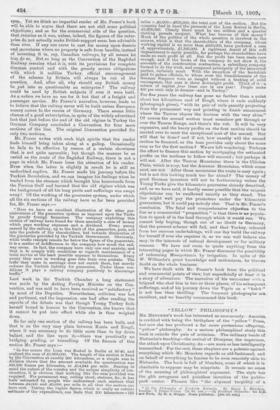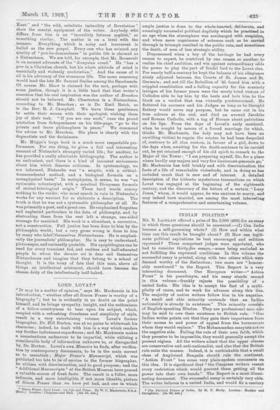"YELLOW" PHILOSOPHY.*
MR. MaNeKEN's work has interested us enormously. America, is credited with being the birthplace of the " yellow " Press, but now she has produced a far more portentous offspring, " yellow " philosophy. As a serious philosophical study this. book is outside the pale of criticism. The ordinary heads of Nietzsche's teaching—the revival of Dionysus, the superman, the attack upon Christianity, &c.—are more or less intelligently transcribed. IV the rest, these chapters are a polemic against everything which Mr. Mencken regards as old-fashioned, and on behalf of everything he fancies to be even remotely akin to. Nietzsche. The book is full of blunders, some of which it is charitable to suppose may be misprints. It reveals no MIRO of the meaning of philosophical argument. The style has the glib arrogance and pointless invective of the public- park 'orator. Phrases like "the abysmal turgidity of a " (1) The Phitesophy of Friedrich Nietzsche. By Henry L. Heuekon. London : T. Fieber Unwin. [75. Bd. not.)—(2) Prirdrieh Nietzsche: his Life, and Work. By AL It. Mugge. Same publisher. Lies. ed. neta , Kant" and "the wild, cabalistic imbecility of Revelation" show the mental, equipment of the writer. Anybody who differs , from him is an "incredibly fatuous sophist," or something similar.. The matter is on a level with the , manner. Everything • which is noisy and irreverent is hailed as the new gospel. Every one who has evinced any quality of "you-be-damnedness " in public life is claimed as a Nietzschean. We are told, for example, that Mr. Roosevelt , is an earnest advocate of the " dionysian creed." He "has a pew in a Christian church, but his whole attitude of mind is essentially and violently unchristian." And the cause of it , all is his advocacy of the strenuous life. The same reasoning would land the late Mr. Samuel Smiles among the Bacchanals. Of course Mr. Shaw is claimed for the sect, perhaps with some justice, though it is a little hard that that writer's
• assertion that his real inspiration was the author of Erewhon should not be believed. Mr. Chesterton is a Nietzschean, according to Mr. Mencken ; so is Dr. Emil Reich, so is the Rev. R. J. Campbell. We leave these gentlemen to settle their scores with their apologist, wishing them joy of their task. "If you are one such," runs the proud quotation from Schopenhauer on his title-page, "go to the priests and leave philosophers in peace." We • commend the advice to Mr. Mencken. His place is clearly with the • dogmatists and the •declaimers.
Mr. Miigge's large book is a much more respectable per- formance. For one thing, he gives a full and interesting account of Nietzsche's strangely varied life ; for another, he has provided a really admirable bibliography. The author is an enthusiast, and there is a kind of innocent seriousness about him which disarms criticism. In epistemology, we are informed, Nietzsche was "a sceptic, with a critical- transcendental method, and a biological formula on a metaphysical basis." In metaphysics, it seems, he was "an optimistic voluntaryist, with a mystical Dionysean formula of stoical-teleological origin." These hard words convey nothing to the reader, who must search in vain in Nietzsche'a works for any warrant for so elaborate a description. The truth is that he was not a systematic philosopher at all. He was primarily a poet, and a great one. He emphasised forgotten and neglected particulars in the data of philosophy, and by abstracting these from the rest left a strange, one-sided message for mankind. His work is a stimulant, a corrective, not a construction. ' Full justice has been done to him by the philosophic world; but a very gross wrong is done to him by many who laberthemselves Nietzscheans. He is emphati- cally the journalists' philosopher. He is easy to understand, picturesque, and eminently quotable. His apophthegms can be used for every transient fad, and restless and half-educated people to whom the dernier eri is dear call themselves Nietzscheans and imagine that they belong to a school of thought. It is the irony of fate that this man, above all things an intellectual aristocrat, should have become the chosen deity of the intellectually half-baked.







































 Previous page
Previous page